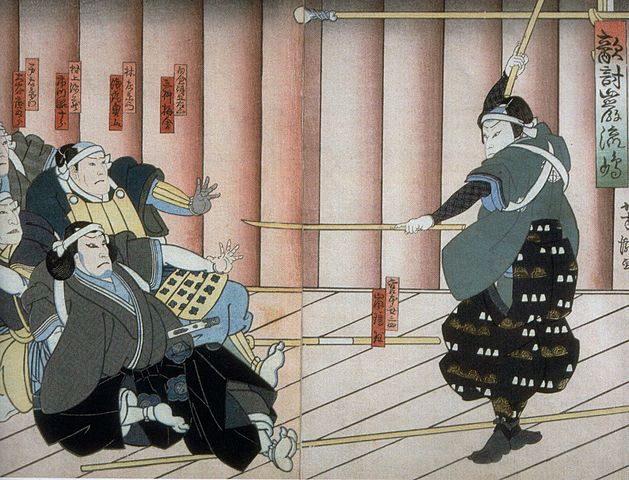Image credit: Yoshitaki Tsunejiro
Every culture has its legends. Some of them are born from imagination and become treasured fables, but others are rooted in historical fact and are studied for wisdom and knowledge.
Japan has many of both kinds.
You will also notice that Japan has quite a fascination with swords, and in particular the katakana. This is of course due to the mighty samurai warriors that were such an integral part of Japan’s history.
But there is one swordsman in particular who was a cut above the rest (pun intended). He is considered to be the greatest one in all of Japan’s history, and perhaps even in the history of the entire world.
What’s even crazier is that he was not actually a samurai. He was a rōnin (浪人) – a wandering samurai who had no lord or master.
Since the word 侍 samurai literally means “to serve” it is required that one has a lord or master in order to be a true samurai. In addition to that, you also have to be born into the samurai class.
You can read more about the different classes in Japan’s history by clicking on this link.
The greatest swordsman was none other than Miyamoto Musashi (宮本 武蔵). Learn about his life and his philosophies to understand the mind of a true warrior and of the Japanese.
Who is Miyamoto Musashi?
Miyamoto Musashi was born to a samurai father, so being a warrior was in his blood. However, Musashi’s mother died and his father eventually left him at a young age. You would think that Musashi would be weak and afraid because of this.
Oh, how wrong you would be!
Musashi’s first battle was against a full-blown samurai when Musashi was only thirteen years old.
That’s right. Before he was old enough to drive! Not that they had cars back then… He was born in 1584 AD and lived to be 61 years old before he passed away, so I don’t quite think they had vehicles yet.
He never married and it is unknown if he ever had kids or not. But hopefully he did and was able to pass on his warrior bloodline. It’d be cool to win that genetic jackpot!
He fought in over 60 duals and he never lost once.
NOT. EVEN. ONCE.
Back then, a warrior would either succeed or die. There was no “next time” for them on the field of battle.
But of course there were friendly spares between people back then. They had to agree to it beforehand, and the match was usually decided when someone landed the first blow.
While he was a child his father taught him 武士道 (bushido) or “the way of the warrior.” However, after Musashi was on his own he decided to join a monastery and learn Zen Buddhism.
Learning Zen Buddhism was actually quite a common practice for warriors since it allowed them to gain control over their minds and emotions.
More than Just Swordsmanship
Something that Musashi knew and lived, that most of his opponents did not, was that the battle was not just determined by who was the better man with a blade.
Musashi incorporated mind games against his opponent to aggravate them and take advantage of their enraged state. When you’re mad, you lose focus.
He would oftentimes show up to the dual late and look like a hobo just to irk the other guy, and sometimes he would even kill him with a wooden sword!
That’s right Zelda fans, wooden swords actually work!
In one particular case, the people came to expect him to show up late, so he switched it up and arrived early to the dual instead. With this particular dual, his opponent showed up with a lot of other guys (dirty move) in order to team up against Musashi. But Musashi had anticipated this (genius) and was already hiding in the bushes.
He jumped out of his hiding spot and killed his opponent before fighting his way through all the other men.
While most samurai were concerned with looking good and fighting the “proper way”, Musashi was really only concerned with one thing: Winning the dual. A warrior does whatever it takes to succeed.
During his later years, he stopped participating in duels to the death and picked up teaching, writing, and even painting instead. He was known as the 剣聖 (kensei) or “sword saint” for being an undefeatable badass.
He even developed his own dual-wielding sword technique called 二天一 (niten ichi) which means “two heavens as one.”
Just like that moment in Sword Art Online where Kirito activates his dual-wielding skill and beats the Minotaur! Heck yeah!
13 Musashi Quotes to Help You Learn Japanese
Now we get to see inside the mind of this legendary warrior. He said a lot of very wise things during his lifetime. I’ve selected these 13 quotes of his, about life and battle.
Since this is a blog about learning Japanese, try and think of how each of these quotes can be applied to learning the language. You might be surprised at how apt they are.
1: “You can only fight the way you practice.”
2: “You must understand that there is more than one path to the top of the mountain.”
3: “It may seem difficult at first, but everything is difficult at first.”
4: “The purpose of today’s training is to defeat yesterday’s understanding.”
5: “Step by step walk the thousand-mile road.”
6: “Fixation is the way to death. Fluidity is the way to life.”
7: “In time, all things work to your advantage when you pursue them with an open heart.”
8: “Do not waste time idling or thinking after you have set your goals”
9: “Accept everything just the way it is.”
10: “Even if a man has no natural ability, he can be a warrior.”
11: “Do nothing which is of no use.”
12: “A man cannot understand the art he is studying if he only looks for the end result without taking the time to delve deeply into the reasoning of the study.”
13: “One must make the warrior walk his everyday walk.”
What do you think of these quotes? Any of them stand out to you in particular?
For me, “You can only fight the way you practice” really stands out to me as a philosophy that should be applied to life.
For example, if you want to be able to speak Japanese, then your practice had better be full of speaking Japanese and not just listening to it and selecting the correct answers.
The Book of 5 Rings and the Mindset of a Warrior
![]()
It often times gets compared to, or associated with, The Art of War by Sun Tzu. But whereas The Art of War is about strategy between warring armies, The Book of Five Rings is about the individual warrior.
I personally loved this book way back when I first read it. If you’ve ever wondered what it’s like to live in a “do or die world” then pick it up to learn about the attitude of one of the world’s foremost warriors.
Even though we don’t see a lot of conflict like this in our own daily lives, there are definitely a lot of mental attitudes that you can find and adopt in order to strengthen your own will and spirit.
Sometimes bad things happen in life. You gotta’ be a warrior at those tying times.
In addition to that, you can also find a good biography on Miyamoto Musashi himself if you are interested in learning more about his life from when he was a child and began his journey on the path of the warrior, up until he took on the role of teacher and eventually passed away.
And there is also a manga about him too! I actually just recently learned about it and have not yet been able to find the first volume at the Books-A-Million that I frequent. I just might have to pick up a copy of it online if they don’t get one in soon.
If you’re interested in learning more about Musashi, then here’s where you can go:
Further Reading:
The Man, The Legend
There are tons and tons of historical figures from Japan. You could probably spend hundreds of hours learning about them and not even begin to scratch the surface.
Miyamoto Musashi has always been one of my personal favorites, so I thought I’d share what I know about him with you.
But I’d love to hear from you on this topic!
Leave me a comment and let me know what you think about Miyamoto Musashi. Have you read any books on him?
Or are there any other legendary figures from Japan that you think are awesome?
Further Resources for Learning Japanese:
#3 Get My eBook (Secrets to Learning Japanese) for Free

またね!


This guy is really quite amazing. Thanks for the quotes too! I really like how he said “not to do anything of no use”. Some people never understand the importance of that. Many people find and use ineffective approaches to things (including learning Japanese) and never change it up even when it’s not working.
Hey Aden, yeah I totally agree. That was even kind of the reason I had for starting JT in the first place. The majority of people who learn a new language, and that includes Japanese, do it the traditional way in a classroom.
And while this method does indeed work for some people, it doesn’t for the majority of them. Since there are alternative ways of learning out there, and some of them are way more effective, I thought that I’d help people learn about them and see how it can be applied to learning Japanese in particular.
And Miyamoto Musashi was a total badass! I love learning more about this guy! He’s got tons of quotes, but most of them are more for “life and death” situations. I tried to find ones that people nowadays could use in their lives.